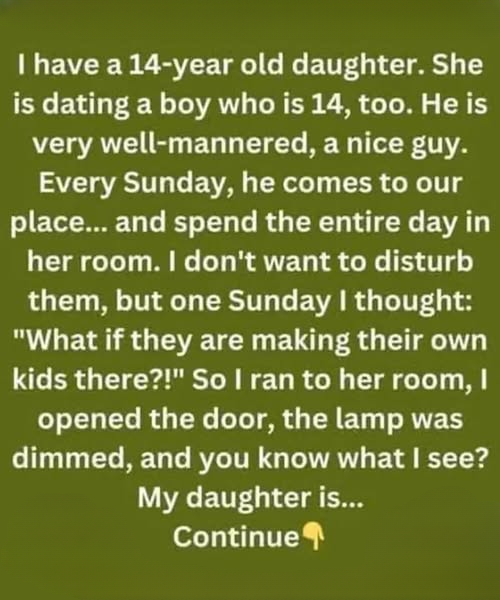When my fourteen-year-old daughter started dating, I thought I was handling it with grace—calm, trusting, composed. One ordinary Sunday afternoon shattered that illusion completely. What began as a peaceful day ended up teaching me more about parenting, fear, and trust than any advice column ever could.
Lily had been seeing a boy from school named Daniel. They met during a science project and instantly bonded over obscure indie bands and terrible puns—her two favorite things. From the beginning, Daniel seemed polite and respectful. He greeted me warmly, looked me in the eye, and never arrived without Lily’s favorite candy. A genuinely good kid, it seemed.
For months, Daniel came over almost every Sunday. They spent hours in Lily’s room—door mostly closed—talking, laughing, and supposedly studying. I’d always prided myself on giving Lily her space. I wasn’t the type to hover or demand constant updates. I trusted her.
At least, that’s what I thought—until that one Sunday.
The Spiral
It started simply. I was folding laundry, glancing at Lily’s closed door. The light was dim. They’d been in there for hours. My mind whispered: What if they’re not just studying?
That single thought jolted me like electricity. Suddenly, my imagination spun out of control—visions of reckless teenage decisions and mistakes that could change everything. Logic tried to intervene. She’s responsible. You trust her. But logic never wins against fear. My heart raced as the laundry basket slipped from my hands. Before I could stop myself, I was walking down the hallway, turning the doorknob, and pushing the door open—without knocking.
The Reality
What I saw made me feel both relieved and ridiculous.
The lamp was dimmed—but only to soften the glare on Daniel’s notebook. Lily was cross-legged on the floor, wearing old sweatpants and an oversized hoodie, explaining algebra with saint-like patience. Daniel, utterly defeated by pre-algebra, scribbled notes and asked questions.
The room was a battlefield of learning—open textbooks everywhere, sticky notes on the walls, half-eaten cookies on the desk. They were so focused they didn’t notice me.
“No, look—see?” Lily said. “You don’t have to graph it first. Just use the slope formula—it’s faster.”
Daniel frowned. “Wait. So I’ve been doing extra steps this whole time?”
“Exactly,” she laughed. “You’re overcomplicating it.”
When they finally looked up, both froze. “Mom? Are you okay?” Lily asked.
“Oh! Uh, yeah. Just checking if you need anything—snacks? Water?”
“We’re fine,” she said, polite but firm.
Daniel nodded. “Thanks, Mrs. Carter. I’ve got a big test Tuesday—she’s saving my life.”
I muttered something about leaving and backed out like a burglar caught mid-theft.
The Guilt
Once alone, shame hit me hard. What kind of mother barges in expecting the worst? Lily had never given me reason not to trust her—yet I let panic take over.
It wasn’t about Lily. It was about me. My fears, my need for control, my dread of watching her step into a world I couldn’t protect her from.
I’d always vowed to be different from my own mother, who never trusted me alone. I promised myself I’d give my child freedom. But faced with Lily’s independence, I panicked—just like every other worried parent.
The Conversation
That night, after Daniel went home, I knocked—properly—on Lily’s door.
“Hey, Mom,” she said.
“Can we talk for a minute?”
“Sure.”
Sitting on the edge of her bed, I said quietly, “I want to apologize for earlier. For not knocking.”
She shrugged. “It’s okay.”
“No, it’s not. It’s your space. You deserve privacy.”
Her eyes widened. “Wait—you thought Daniel and I were—oh my God, Mom! We were studying! He’s literally failing math!”
I laughed awkwardly. “Yeah, I figured that out once I saw the algebra explosion.”
She smiled. “It’s okay. You’re a mom—it makes sense you’d worry.”
“I just should have trusted you,” I admitted.
She nodded. “Actually… Daniel and I talked about boundaries, what we’re comfortable with. We’re not ready for anything else. We just like hanging out and helping each other.”
Something inside me eased—a quiet, humbling pride. “I’m really proud of you, Lily. You’re thoughtful and responsible… and clearly listening more than I thought.”
We laughed together, tension finally gone.
What I Learned
That moment taught me more than any parenting book ever could:
-
My job isn’t to control my daughter’s choices—it’s to give her the tools to make good ones.
-
Fear can twist reality. Sometimes a closed door hides nothing more dangerous than algebra.
-
Open communication builds trust.
-
Admitting when you’re wrong matters.
-
Trust doesn’t mean letting go completely—it means staying connected without controlling.
Moving Forward
Since that day, I knock before entering, check in with care, and ask, “How’s studying going?” instead of assuming the worst. I’ve gotten to know Daniel better. He’s polite, funny, and still hopeless at math—but improving. Watching them together, I realized teenagers really are just being teenagers—awkward, sincere, and kind.
To Other Parents
If you’re caught between trust and fear:
-
Worry doesn’t make you a bad parent—but letting it control you might.
-
Start with trust. Build communication early. Know the difference between privacy and secrecy.
-
Believe your child until they give you reason not to.
-
And when you mess up—own it.
That Sunday, I didn’t walk in on a crisis. I walked in on a reminder. My daughter wasn’t doing anything wrong—she was doing everything right: being kind, responsible, and honest. The real problem wasn’t in her room—it was in my head.
Sometimes, the hardest part of parenting isn’t what our kids are doing. It’s letting go of who they were—and trusting who they’re becoming.
And sometimes, a closed door doesn’t hide rebellion. It hides nothing more dangerous than algebra homework—and a whole lot of growing up, quietly unfolding right before our eyes.
